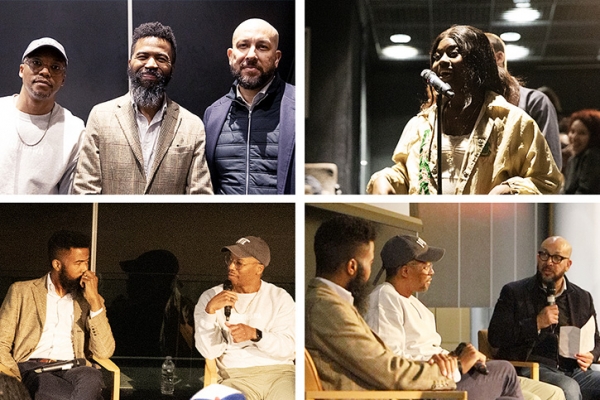
Matthew Muniz
While the solar eclipse captivated viewers outdoors on Monday afternoon, eager students were filing into Roone Arledge Cinema to the sounds of hip-hop legends The Clipse playing over the speakers. Students were there for a session of “Hip Hop at 50: Music, Politics, Religion,” taught by Dean Josef Sorett, who also is a professor of religion and African American and African diaspora studies. The event featured two guests in conversation with the dean: Lupe Fiasco and Joshua Bennett. “We want to theme-song this entire thing,” Fiasco said. “What’s more optimal than playing The Clipse while the eclipse is happening? Bars, you know what I’m saying?”
Fiasco is a Grammy Award-winning American rapper, record producer, entrepreneur and community advocate, while Bennett is an acclaimed author, poet and professor of literature at MIT. The goal of “Hip Hop at 50” is to introduce students to the study of religion through engagement with the history of hip-hop, examining how religious ideas and practices have influenced rap’s evolution and expansion. Early in the conversation, Sorett mused about the complex connection the class has examined all semester: “Is it hip-hop vs. religion, hip-hop and religion, hip-hop as religion?” he asked.
Bennett commented on how Black religious communities have long been a source of inspiration for the arts. “I’m writing a book about Black prodigies — Aretha Franklin, Stevie Wonder, James Baldwin — and it’s not an accident that so many of them discovered their prodigious gift in church,” he said. “Black music, Black literature, Black genius are inextricable from Black institutions.”
Bennett was raised in a Christian home while Fiasco’s parents were members of the Nation of Islam; the two shared how their religious foundations and experiences are inextricable from their lyrical works today. Bennett recounted sneaking around with his older sister to listen to secular records, which were banned in his childhood home. “When I was in middle school, [Jay-Z’s, who also goes by Jay-Hova] ‘H to the izz-O, V to the izz-A’ came out; I felt like the hook was blasphemous, I felt I couldn’t sing it. I had this internal struggle that God was going to strike me down for singing this infectious hook on this album that I loved.”
Fiasco spoke about how both the Nation of Islam and his family’s practice of martial arts, which was influenced by Eastern religious traditions including Daoism, Zen Buddhism and Shinto Buddhism, have shaped his approach to writing. “Religion pushes and pulls,” he explained. “I don’t think you can escape religion in music,” he added, highlighting performers with overt religious takes in their works (like Bob Marley’s proud Rastafarianism) and artists with more nuanced takes on religion (like Wu-Tang Clan’s allusions to the Five-Percent Nation Islamic movement).
After the spirited 45-minute discussion, the three opened the floor for a Q&A session. Students lined up to ask questions, touching on everything from the role of church in Black communities, to the legacy of rap, to how the panelists’ religious views have changed through the years and how their religious beliefs have affected their careers.
The event concluded with a large round of applause for Bennet, Fiasco and Dean Sorett, with the far-ranging conversation keeping the audience captivated for an hour, eclipsing the phenomenon outside.